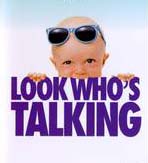Look Who’s Talking
 for unspecified reasons.
for unspecified reasons.
Reviewed by: Brett Willis
CONTRIBUTOR
| Moral Rating: | Very Offensive |
| Moviemaking Quality: |
|
| Primary Audience: | Teen to Adult |
| Genre: | Romance Comedy |
| Length: | 1 hr. 33 min. |
| Year of Release: | 1989 |
| USA Release: |
| Featuring |
|---|
| Kirstie Alley, John Travolta, Olympia Dukakis, George Segal, Abe Vigoda, voice of Bruce Willis |
| Director |
|
Amy Heckerling |
| Producer |
| Jonathan D. Krane, Simon R. Lewis, David Enson, Bob Gray |
| Distributor |
This unusual film is full of objectionable material, yet has some thought-provoking and pro-family elements plus the novelty device of a talking baby.
Our culture’s post-Christian sexual mores, as defined by advice-givers and talk-show hosts, seem to be: (1) Sex during dating is normal, just keep it “safe.” (2) Those in serious relationships shouldn’t sleep with a third party without their partner’s permission. (3) People should take responsibility for any children they conceive, unless they decide to kill them. This film starts at about the level of those “standards,” then raises the bar a few notches here and there.
Molly (Kirstie Alley, “Shoot to Kill”, TV’s “Cheers”), a CPA, is having an affair with her client Albert (George Segal), an older married man. In the opening sequence, they decide to mix business with pleasure. But we don’t see anything explicit, in the normal sense (there’s no simulated sex or visible nudity anywhere in the film); instead, we cut to a special-effects comedy scene of conception from the sperm’s point of view.
While waiting for Albert to leave his wife, Molly concocts a cover story about being artificially inseminated. Molly is near full-term when she learns Albert is dumping his wife not for her but for another mistress; the shock sends her into labor. (Because Molly’s character was developed while that of Albert’s wife was not, it’s “natural” for us to sympathize more with Molly; that’s an example of the power of cinema to dictate our attitudes.) James Ubriacco (John Travolta), the cabbie who takes her to the hospital, is assumed to be her husband and is whisked against his will into the delivery room. He becomes attached to Molly and her baby, Mikey. But Molly’s taking it slow because she’s a little wiser now and wants only the best father for Mikey.
Mikey (voice of Bruce Willis) doesn’t really “talk,” but we can hear his thoughts. This isn’t the first time that device has been used (there was a ’50s sitcom that did the same thing), but it’s well done and is hilarious at times. Other babies and toddlers also “talk” with their thoughts, and can “hear” each other. I know that Hollywood is always up to something, and that Alley and Travolta are Scientologists, but this silent communication didn’t strike me as telepathy or spookiness. It was more a fun thing, like the secret lives of the toys in “Toy Story.” Since Mikey talks as a fetus and an embryo, the unborn are “humanized;” but this effect is diluted somewhat because “pro-Mikey” even talks as a sperm cell (and has an orgasm while penetrating the egg).
Negative Content
Profanity, vulgarity and comedy sexual innuendo are thick and varied. There’s one use of f*, when Molly yells for drugs during delivery in a strange, low-pitched voice. Both James and Molly think nothing of lying and “bending the rules” to get what they want in life. Albert, though rich and powerful, is a real loser.
Positive Content
We see that the things a pregnant mom does (including taking painkillers) affect her unborn child. Molly has no intention of getting an abortion, though she doesn’t say why. At one point Molly and James start to make out and get partly undressed; but then she has a quick vision of what their future together might be like, and she backs off. As she dates other guys, she makes the same mental projection of life with each of them. Molly takes it as a given that Mikey does need a father. James, con man or no, goes to a lot of trouble to get his grandfather Vincent (Abe Vigoda) the best care. The film gives a glimpse of the tremendous amount of work involved in taking care of a baby. The scenes of Mikey bonding with James are touching, although Molly should have made up her mind to choose James as her partner before she allowed that bonding to occur.
I believe the most outstanding positive element is this: When Molly tells her mother Rosie (Olympia Dukakis, “Dad”) that “You can’t control who you fall in love with” (justifying her affair with Albert), Rosie replies that it’s the same as giving up your favorite food when the doctor says you can’t have it anymore. In other words, love isn’t an emotion; it’s a choice. And she’s right on! The Bible commands love, including love between husbands and wives (Eph. 5:25; Col. 3:19; Titus 2:4). Emotions can’t be commanded; conscious decisions can.
The soundtrack has several pop songs, from recent stuff all the way back to the Beach Boys and even Gene Pitney. Some of the songs are used pretty cleverly.
A few generations ago, it was considered indecent for newspapers to advertise toothpaste. And here I am giving a semi-positive recommendation on a film with jokes about sperm donors, postpartum depression, breast milk, soiled diapers etc. Guess times have changed. Adults and teens who don’t ordinarily watch PG-13 films shouldn’t make an exception here. But those who can tolerate such material will find some sobering teaching about responsibility, cleverly blended in with the humor. All in all, this film might make some people think twice about the consequences of their behavior.
don’t click this off too soon during the roll-ups, or you’ll miss seeing Mikey’s little sister Julie (voice of Joan Rivers).
Followed by: “Look who’s Talking, Too” (1990) with Roseanne Barr as the voice of Julie, and “Look who’s Talking Now” (1993).


PLEASE share your observations and insights to be posted here.



